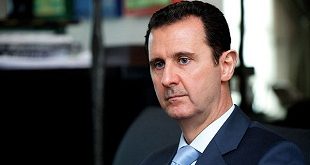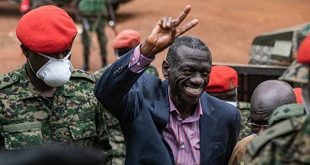
By Haggai Matsiko
The entry way to opposition leader Kizza Besigye’s home in Kasangati, a Kampala city suburb has become familiar even to those who have never been there. Most have seen the pinkish-red walls of the brick-red tiled bungalow on TV as heavy deployment of police attempt to keep President Yoweri Museveni’s main rival behind his craftsman-style black wood and metal gate.
In the latest incident, on Oct.8, several anti-riot, and anti-terrorism police laid a siege around his Kasangati home following a late-night scuffle he had with security operatives over a tyre spike that they had put in front of his gate to block any movement of vehicles.
These were more in number and more equipped with batons and anti-riot gear compared to the security operatives swirled around his home, along the road leading out, to the T-junction where it joins the main road on Oct. 6. Here they staged a heavily guarded road block that forced passersby to pass in between two police pick-ups menacingly facing each. Anyone going in 0r out had to answer queries on who they were and what they wanted from Besigye.

As we passed them, on our way to the Forum for Democratic Change (FDC) leader’s press briefing on Oct. 6, there were about 20 police officers, some on alert, seated on the pick-ups. They are a cynical bunch. Why are you deployed so heavily around the retired colonel’s home, we asked? Merely to give him security and ensure his walking does not disrupt people’s businesses, they replied.
But Besigye refuted this claim. To make his point, and show journalists how the tight police’s blockade cannot allow his to cross the road that separates his home and his farm, he walked to just outside his gate. Immediately security operatives swung around him from all corners of his compound. They were all on alert, some got on their phones and radio calls as others readied their guns. Besigye continued walking.
Just as he approached the T-junction with its menacing roadblock, the officers could be seen jumping off the pick-ups and positioning their guns. Suddenly their numbers had surged to about 35 as some scattered taking cover in what looked like a battle front. Yet police kept pouring in and a blue van parked in front of him, blocking his access to the main road.
“Where are you going Doctor,” Kampala North Police Operations Commander Sam Omala said “for the peace of Kampala, you know you are not allowed to go walk. Today, you are not going anywhere. We shall not allow you to disrupt national celebrations.”
Besigye is a dare-devil, with big bulging eyes that usually look fiery with anger. This time he feigned calmness and gently attempted to push his way through the cordon. He told the police he was going to pick his Shs 2.75million, a belt and shoes, that he had left at the nearby police station when he was detained the previous day. No way. Commander Omala ordered that they be brought to him instead. In a matter of minutes another police pick-up had pulled-up with yet more reinforcements and the money. The belt and shoes were missing. An argument ensued with the officers insisting that Besigye went with the shoes and the belt and Besigye disagreeing. A police discharge receipt showed that Besigye had not signed for anything though some officer had ticked the carbon copy of the receipt showing that he had taken the shoes and the belt.
“Who was in charge, how come he did not sign when he took the shoes and the belt, this is a very big omission,” Omala said as the new Kasangati Division commander, Seiko Chemonges made calls to ascertain the fate of the opposition leader’s missing items.
Chemonges looked tense. He knows he replaced Alfred Bagambaki who, together with Old Kampala Division Commander Rusoke Kituuma, were fired and transferred to upcountry divisions after they failed to stop Besigye from sneaked out of his blockaded home and leading protests in Kampala on two occasions on Oct.1 and Oct. 4.
Besigye who is slated to hand over the presidency of FDC to new leadership in November is the de facto leader of the amorphous activist group, For God and Country (4GC) that morphed out of the Activists For Change (A4C) that the government banned earlier this year following the deadly Walk to Work protests. As the rest of the country geared up for celebrations of 50 years of Independence, Besigye’s group on Oct.1 launched a fresh round of protests dubbed Walk to Freedom.
Police and government officials promptly accused the activists of aiming to cause mayhem and sabotaging the golden jubilee celebrations. They arrested Besigye twice Oct.1 and 4 and detained him for hours before dumping him at his home and blockading it off.
“If a citizen cannot move freely under independence, if that is independence then that independence should hang,” Besigye told journalists, “for us we are saying that this is a point of no return, Ugandans should remain steadfast and protest in black to show their discontent.”
Besigye, who has beaten the cordon around his house a few times, insists in his usual intractable style that he will make his way to town whenever he wants. “These fellows (police) who are hanging around seem to think they can stop me from going to town, which I think is sheer delusion because I will walk whenever I want to.
“We have drawn the line. We will protest and continue to protest until we are free that is why we have called it the walk to freedom.”
Critics have accused Besigye and his henchmen of causing chaos and sabotaging business in the name of fighting for change. Police also insisted that Besigye was out to disrupt golden jubilee celebrations. Others have questioned why Besigye keeps walking fully knowing that whenever he does, his followers are fired at with live bullets, tortured and others incarcerated.
Regime apologists
But the 1986 bush war hero says that those who accuse him of causing chaos are regime apologists and that whoever wants change has to fight for it. He says those in the government that accuse him of leading to loss of lives are forgetting that the war that brought NRM to power claimed many lives.
“When Museveni went to the bush,” Besigye said, “ half a million people were killed… if he went to the bush why should he think that other people who feel equally oppressed should not protest?”
Besigye adds that people become slaves when they fear to risk fighting slavery.
“Are Ugandans saying that the innocent should not come out because the criminals will crash them?” Besigye asks, “We should unite to remove the criminals. This is a protracted struggle, these police who are sleeping in the rain; they will start asking questions also.”
He points to Oct.4 to make a case that it is the police that cause chaos. On that day, he says that people jubilated and showered him with money and all sorts of gifts that are rotting away in his car at police. “Our people are very poor,” Besigye said, “but to see that they were jubilating and giving me even the little they have shows they were happy I had made it to town.”
Besigye himself told journalists that his aides—Francis Mwijukye, Sam Mugumya and Robert were arrested on Oct.4, detained without trial for several days, transferred to Kasese where they were charged with simple robbery and sent to Mubuku Prison.
In Kampala alone, over 70 people were injured on Oct.4 when Besigye led protesters in Kampala. And while returning from visiting Besigye, the Mayor Kawempe Division Sam Munyagwa was arrested allegedly on the orders of Kampala Metropolitan Police commander Andrew Felix Kaweesi bundled into a mini-bus and whisked to Kasangati, from where he was driven blindfolded to Kireka Special Investigation Unit. All along, Munyagwa in his letter to the Inspector General of Police, Kale Kaihura notes that he was tortured with a pistol stuck into his mouth to an extent that he can hardly eat or walk. According to Besigye, Munyagwa intimated that at Kireka, he met about 17 young men that have been arbitrarily arrested and tortured.
Apart from his close supporters, Red Cross put the number of the injured at about 70, some with bullet wounds. Journalists covering the fracas were not spared. Many were beaten and some lost their cameras, records and other property.
Museveni’s fear
At the heart of this excessive force, is the determination by the government not bow to Besigye’s radical pressure. In April 2011, the opposition leader nearly lost his life when security operatives descended on his vehicle shattered its glasses, sprayed him with pepper spray almost impairing his sight and hearing. He recovered from Nairobi and has been travelling for medical attention in the US. But on his return from Nairobi, scores that gathered along Entebbe road to welcome him dwarfed the liberation celebrations that had attracted international delegations and Presidents. It was not only joy, over all hundreds were injured and about ten lives lost to gun fire—the riots dented Uganda’s image with the United Nations recording the worst human rights violations.
Although they have faced off thrice in the presidential election and Besigye has either come close to winning or won depending on who you talk to, President Museveni has made it clear he can never hand over power to him.
Some say, Museveni fears that given his radical character, Besigye could revenge for the torture the government has meted on him. That is why, observers say, many in NRM prefer Gen. Mugisha Muntu to beat off Leader of Opposition Nandala Mafabi and become FDC president and flag bearer. Muntu is seen as more tolerant and accommodative than either Besigye or Mafabi.
However Besigye, by maintaining his radical character and participating in protests, is further cementing his support base as a strategy to bounce back and challenge Museveni in 2016.
In an exclusive interview with The Independent, Besigye responded to alleged fears by some of the top leaders in Museveni’s government about his radical character and the implications such would have on them if he took over power.
He noted that such fears are part and parcel of dictatorships, adding that dictatorships use that fear to subdue the masses. “However some dictators have negotiated their demise and it can happen here,” he said, “In such cases, some elements in the dictatorship can salvage themselves and even participate in the new government.”
“I have no problem with negotiations but it is those who harbor such fears that are supposed to initiate them not me,” Besigye said, “and this can only happen through national dialogue.”
Besigye however, emphasized that all this cannot happen with the NRM government which he said is bent on clinging on to power.
He noted that ever since independence, no leader In Uganda has handed over power peacefully and Museveni is also using all the tricks in the book to hang onto power until he is removed forcefully taking back the country to square one.
“Realistically, it is not possible for a lion to transform itself into a sheep,” Besigye said, “some people may wish but it is just a wish that is why we are saying that first of all this dictatorship must be forced out through civil disobedience to enable a transition to democracy.”
Reflecting on the country’s past dotted with wars, coup d’états and bloody protests, many Ugandans silently hope for peaceful change of government. However, such hopes are only thin as the opposition activists threaten to oust the government through civil strife.
But for 26 years, President Museveni has overseen a regime where his former bush war comrade and physician, Besigye, has been arrested in the most inhuman of ways, beaten and detained on trumped-up charges.
Besigye who married Museveni’s former fiancée, Winnie Byanyima was the first of the NRM historical to denounce the party in his 1999 dossier, An Insider’s view of how NRM lost the broad-base.
Museveni had Besigye court-martialed for openly criticising the party. Some had hoped that such issues would be discussed and resolved. Since then Besigye has been put under house arrest, his relatives tortured, he has been arrested in the most demeaning of manners and detained on trumped up charges as if to teach him a lesson that he is playing with a wrong person. But with every arrest and inhumane treatment, Besigye has become more radical and made sure that those in government are aware that with a change in government, they will pay for their sins.
“We have hope that we shall take our country back,” Besigye said, “dictators should be shunned.”
 The Independent Uganda: You get the Truth we Pay the Price
The Independent Uganda: You get the Truth we Pay the Price


